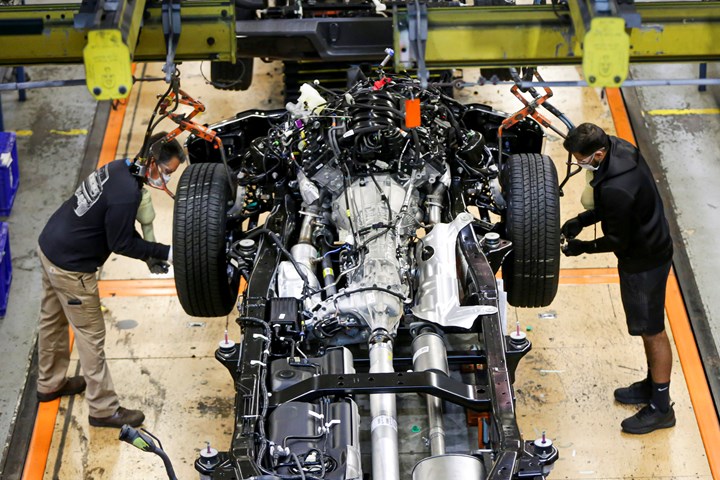
Opening day jitters, supply chain concerns abound
It will be slow-going this week as the auto industry’s U.S. assembly plants ease back into production during the coronavirus pandemic.The carmakers and their tier one suppliers have comprehensive safety measures in place at their facilities. But the preparedness among sub-tier vendors varies.
Opening Day Jitters
Many members of the roughly 130,000 returning workforce are nervous about their safety, especially this week as they get comfortable with a long list of new, on-the-job behavioral changes. In some states, those with young children are grappling with the logistics of daycare for kids whose schools remain closed by the pandemic.

Relaunched truck production at Ford’s plant in Dearborn, Mich. (Image: Ford)
Financial issues also cloud the U.S. industry’s manufacturing revival. Top-tier companies generally are stronger financially. But all suppliers have been strained by two months of mandatory plant closures.
Julie Fream, who heads the Original Equipment Suppliers Assn., estimates that one in five North American auto suppliers overall has less than eight weeks of liquidity remaining. Even after they begin selling components, suppliers typically must wait six weeks or more to get paid, meaning that “dire straits” loom for many.
Same Page
Final assembly isn’t possible without a functioning supply chain, of course. The challenge in the weeks ahead will be getting everyone on the same page.
Carmakers also are still sorting out when suppliers in Mexico will be able to get back to work. Last week, central government’s policy about that question shifted position three times in three days. The current guidelines say companies may resume production after today, but not until their safety protocols are approved.
Daimler’s Mercedes-Benz plant in Alabama illustrates the challenges. The facility outside Vance got back to making midsize GLE luxury crossover vehicles late last month after a five-week shutdown.
But the plant suspended operations this week because of a supply problem with a vendor in Mexico. And Bloomberg News says the shutdown will
Resilient Supply Chain
Mercedes won’t be the only one. Most assembly plants across North America will see sporadic supply disruptions as they slowly ramp up operations. It seems obvious that the industry is unlikely to see consistent production rates akin to year-ago levels anytime soon.
But can the industry regain its mojo eventually? No doubt. The auto industry, especially its remarkably resilient supply chain, has done it many times before.
This time the process is being complicated by the need to redesign the plant floor and define new rules about how workers move around the facilities and interact with each other. But these are simply the challenges of new realities, not impossible hurdles.









.jpg;width=70;height=70;mode=crop)



